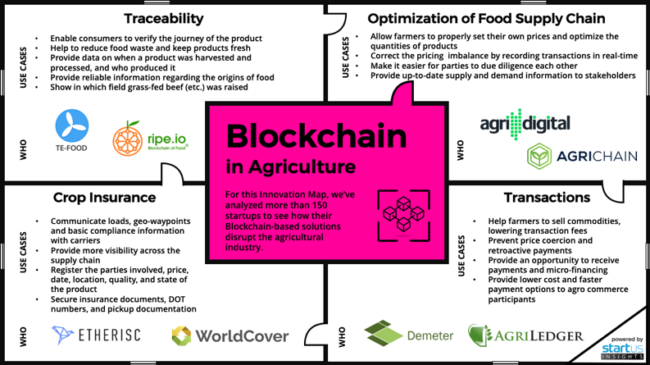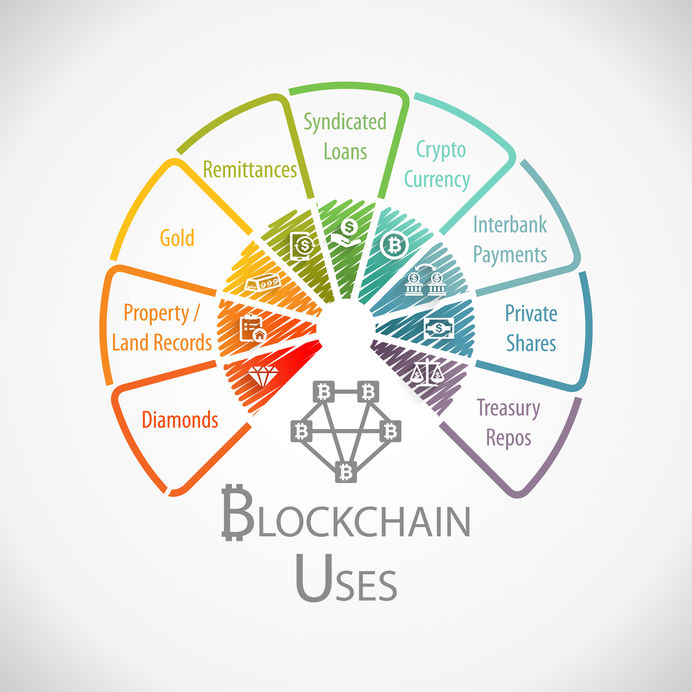Food Safety is of vested interest for both producer and consumer and to achieve that it is important to have the traceability of provenance for knowing if it is fresh and exactly where it comes from, who grew and processed it. This could also help in preventing fraud, false labelling, redundant middlemen, reducing transaction costs and overcoming some challenges of logistics, especially related perishable food items with shorter shelf life. Sam Mire (2018) mentioned that “linking agricultural shipping and monitoring processes using a shared, decentralized Blockchain ledger adds value to agricultural products because machinery, crops, and livestock can be traced by the recipient to prove quality and ethicality and therefore assign a greater value”.
According to the Food and Agriculture Organisation report (FAO) and International Telecommunications Unions (ITU) (Martin Adolph et al., 2019) report “the role of Smart Contracts especially in agricultural insurance, green bonds, and traceability could be very effective. Agricultural insurance built on Blockchain with key weather incidents and related payouts drafted on a smart contract”.
Martin Adolph et al. (2019) mentioned that to make this work, “the framework to support such innovation, such as high-quality data, enabling policies and regulations, should be first addressed in order to ensure the maximum efficacy for Smart Contracts. The process of designing, verifying, implementing and enforcing Smart Contracts in traditional agricultural value chains is still a work in progress, with only a few pilot implementations to show proof-of-concept”.
Besides automated management of agriculture insurance, claims, verification and settlements, using the Blockchain digital ID for fertilizer subsidy disbursements to farmers can also be done without the need for documents or multiple points of authorization.
The World Economic Forum Martin Adolph et al (2019) report that the “Food and Agriculture Organization of the United Nations (FAO) estimates that approximately 20% of the global fish catch is IUU – robbing governments and legitimate fishers of up to $23 billion per year”. The appetite for tackling this issue is clearly growing, with several related initiatives emerging in recent years. According to the FAO ITU report, Blockchain can also be used in the fisheries sector to track and deter illegal, unreported and unregulated fishing (IUU). World Wildlife Fund (WWF) in New Zealand is working on a pilot on a Blockchain Supply Chain Traceability Project that uses digital technology in the fresh and frozen tuna sectors of the Western and Central Pacific region to strengthen supply chain management to stamp out illegal fishing and human rights abuse in the Pacific Islands’ tuna industry.
Figure 11 – Blockchain Use Cases in Agriculture, Source:www.startus-insights.com
- As reported by Startus Insights (2018) and illustrated in Figure 11, and (Sam Mire, 2018), there is much to gain for the agricultural industry in terms of traceability, supply chain, insurance and transaction processing using the Blockchain technology. Some of the use cases are briefly described below.
- AgriChain supports traditional, well-established agricultural supply chains with a dynamic and seamless management software solution(Agrichain, 2019).
- AgriDigital is using the distributed ledgers and Smart Contracts technology since 2015 on the application of Blockchain technologies to global agricultural supply chains and completed the world’s first sale of wheat on a Blockchain by a farmer to a buyer in 2016. In 2017 AgriDigital undertook world-leading pilots in food traceability and supply chain provenance, real-time payments, digital escrows and supply chain finance (AgriDigital, 2019).
- AgriLedger provides Blockchain-based digital identity and supply chain tools for farmers to help with tracing food origins, getting easier access to financing, and storing transactions data (Agriledger, 2017).
- Demeter is working on developing a central hub torent and farm micro fields anywhere in the world – with no middlemen, complexity or the overhead of a big organization(Demeter, n.d.).
- Etherisc has developed a Blockchain-based prototype for crop insurance to farmers via its decentralized insurance applications. When certain conditions are met, for example, a category 5 hurricane, or loss of crop according to a weather report and a satellite image — a self-executing smart contract can trigger a near-immediate payout(Etherrisc, 2019).
- Several other Blockchain-based use cases are Ripe for food supply chain, TE-FOOD – for identification tools to livestock, transports, and fresh food packages supply chain, Worldcovr for crop insurance and OriginTrail – Blockchain driven provenance solutions.
References:
- Agrichain (2019) Agriculture Supply Chain Automation & Management Software Solutions | Farming Software [Online]. Available at https://agrichain.com/about-the-platform/ (Accessed 4 July 2019).
- AgriDigital (2019) AgriDigital – Blockchain [Online]. Available at https://www.agridigital.io/products/blockchain (Accessed 4 July 2019).
- Agriledger (2017) AgriLedger, Revolutionising the Agricultural Supply Chain with Blockchain [Online]. Available at http://www.agriledger.io/home/ (Accessed 4 July 2019).
- Demeter (n.d.) Demeter [Online]. Available at https://demeter.life/ (Accessed 4 July 2019).
- Etherrisc (2019) Etherisc – Decentralized Insurance [Online]. Available at https://etherisc.com/#products (Accessed 4 July 2019).
- Martin Adolph, Ashish Narayan, Hani Eskandar, Suman Mandahar, Violanda de Man, Bridie Ohlsson, Julia Bacher and Angus Rama Keck (2019) E-Agriculture in Action: Blockchain for Agricukture Opportunities and Challenges, Bangkok, FAO & ITU.
- Sam Mire (2018) ‘Blockchain In Agriculture: 10 Possible Use Cases’, Disruptor Daily [Online]. Available at https://www.disruptordaily.com/blockchain-use-cases-agriculture/ (Accessed 4 July 2019).
- Startus Insights (2018) 8 Blockchain Startups Disrupting The Agricultural Industry [Online]. Available at https://www.startus-insights.com/innovators-guide/8-blockchain-startups-disrupting-the-agricultural-industry/ (Accessed 4 July 2019).
Also see:
SDG Indicator 2.4.1 – Agricultural sustainability
How will Blockchain Agriculture revolutionize the Food Supply from farm to plate?






